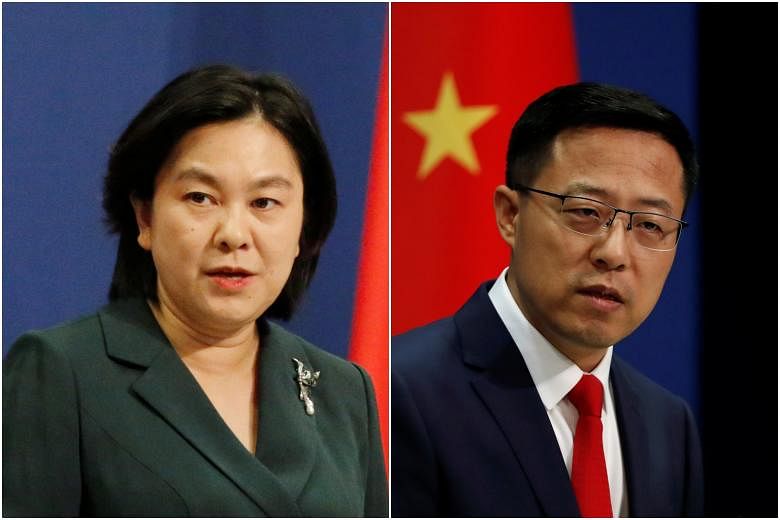BEIJING (BLOOMBERG) - Australian Prime Minister Scott Morrison demanded that Beijing apologise for a provocative tweet depicting one of his country's troops holding a bloody knife to an Afghan child's throat.
Instead, the Chinese Foreign Ministry's top spokesman Hua Chunying shot back, asking whether Mr Morrison lacks "a sense of right and wrong".
The response was a hit in China, where Ms Hua drew praise on social media for exuding the "style of a great power". Her deputy, Mr Zhao Lijian, was similarly cheered on for pinning the offending tweet to the top of his Twitter feed.
China's vast state media complex piled in, promoting stories about the ministry's remarks while the official Xinhua News Agency dismissed Mr Morrison's demand as "utterly absurd" and the Global Times newspaper published an editorial describing Australia as "evil".
The episode illustrates how China's diplomatic rhetoric is increasingly driven by concerns at home, where President Xi Jinping's promise of national rejuvenation and a torrent of overseas criticism led by the Trump administration are fanning nationalistic sentiments.
China's diplomats, who reportedly once received calcium tablets from citizens hoping they grow some backbone, are recasting themselves as one of the Communist Party's most vocal defenders.
Diplomats such as Mr Zhao and Mr Liu Xiaoming, the country's ambassador to the United Kingdom, have become celebrities on China's Internet and are widely known as "Wolf Warriors" in a nod to a Rambo-like action film series.
The trend points to more messy disputes like the ones with Australia and Canada, and raises questions about China's ability to build soft power to match its economic and military might.
"I do think this strategy is more about pleasing the domestic audience," said communications professor Fang Kecheng from the Chinese University of Hong Kong.
"It is not working in terms of building China's image globally. It is working in terms of inciting nationalistic sentiment domestically. It is not working persuading the more liberal-minded Chinese. It is working in terms of answering the call from the top leadership - and the last thing is what they really care about," said Prof Fang.
The shift is just one way that US President-elect Joe Biden's administration is facing a diplomatic landscape that has grown more combative after four years of Mr Donald Trump's Twitter-driven approach.
Besides dismissing the complaints of world leaders such as Mr Morrison or Canadian Prime Minister Justin Trudeau, China's foreign ministry has regularly denounced top US officials such as Secretary of State Mike Pompeo as "evil" and "liars".
China's diplomats enjoy a captive audience in a tightly censored media environment where Twitter and Facebook are banned. The foreign ministry has used its state-controlled platforms to counter overseas criticism by highlighting what they describe as Western hypocrisy on issues like trade, security and human rights, appealing to the party's narrative that it ended a "century of humiliation" by colonial powers.
The ministry's spokesmen regularly swing from calling out other countries' human-rights records to rigorously defending China's. Allegations of abuses against Muslims in Xinjiang - including genocide claims - are countered, for example, by highlighting the US' treatment of Native Americans.
Ms Hua defended Mr Zhao's tweet of the Australian troop image on Monday (Nov 30) as a fair comment on a report finding that the country's special forces soldiers in Afghanistan were involved in 39 unlawful killings of prisoners, farmers and other civilians.
She denied any link between the tweet to their broader dispute between China and Australia, which has accelerated since Australia earlier this year sought an international inquiry into the origins of the coronavirus pandemic.
"The Australian side has been reacting so strongly to my colleague's tweet," Ms Hua told a regular news briefing in Beijing. "Do they think that their merciless killing of Afghan civilians is justified but the condemnation of such ruthless brutality is not? Afghan lives matter."
Australian allies including New Zealand and the United Kingdom joined Canberra in condemning the tweet. The US National Security Council also issued a tweet saying that Australian wine will be featured at a White House holiday reception this week.
On Tuesday, Mr Morrison signalled a desire to avoid escalation in remarks to lawmakers, the Australian Associated Press reported, saying he did not want "further amplification" of the matter.
He also made his own direct appeal to Chinese citizens by posting a message on WeChat defending his "free, democratic, liberal country".
"The post of a false image of an Australian soldier does not diminish our respect for and appreciation of our Chinese Australian community or indeed our friendship with the people of China," he said.
The Chinese Embassy in Canberra also issued a statement on Tuesday, saying that "some Australian politicians and media" were overreacting to the tweet. Australia might be seeking to "stoke domestic nationalism", the embassy said.
"The logic of Xi Jinping's China, where low-level officials are performing loyalty tests back to the centre, means there's very little chance to admit something has gone wrong," said Ms Natasha Kassam, a former Australian diplomat in China who is now a research fellow at the Sydney-based Lowy Institute.
"If those are the terms that the prime minister wishes to re-engage, he'll be waiting for a very long time," she said.
Like Mr Trump, China's diplomats often seek to make journalists covering them part of the story with sound bites that are then circulated on social media. A video of Mr Zhao rebutting a Canadian diplomat's claim that China's population control efforts among Muslim minorities in the western region of Xinjiang fit the definition of genocide last month got more than 50 million views on the platform Douyin, the Chinese version of TikTok.
The next day, Mr Zhao closed the daily briefing by thanking the ministry's fans.
"We hope the website of Foreign Ministry and Weibo, WeChat and Douyin will continue to have your support," he said.

